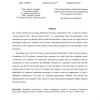Free Online Productivity Tools
i2Speak
i2Symbol
i2OCR
iTex2Img
iWeb2Print
iWeb2Shot
i2Type
iPdf2Split
iPdf2Merge
i2Bopomofo
i2Arabic
i2Style
i2Image
i2PDF
iLatex2Rtf
Sci2ools
117
click to vote
DPD
2002
2002
Dictatorial Transaction Processing: Atomic Commitment Without Veto Right
The current standard in governing distributed transaction termination is the so-called Two-Phase Commit protocol (2PC). The first phase of 2PC is a voting phase, where the participants in the transaction are given an ultimate right to abort that transaction. Giving up that veto right from all participants reduces the overhead of the atomic commitment protocol but also imposes some restrictions on the concurrency control and recovery protocols employed by the participants in the transaction. er gives, for the first time, a precise abstract specification of the Dictatorial Atomic Commitment (DAC) problem, resulting from removing veto rights from the traditional Atomic Commitment (AC) problem. We characterize transactional systems that are compatible with that specification in terms of necessary and sufficient conditions on concurrency control and recovery protocols, and discuss the practical impacts of those conditions. From this study, we capitalize on existing protocols that solve the...
| Added | 18 Dec 2010 |
| Updated | 18 Dec 2010 |
| Type | Journal |
| Year | 2002 |
| Where | DPD |
| Authors | Maha Abdallah, Rachid Guerraoui, Philippe Pucheral |
Comments (0)

